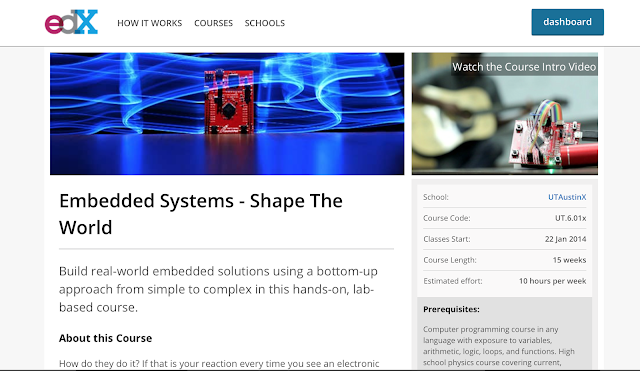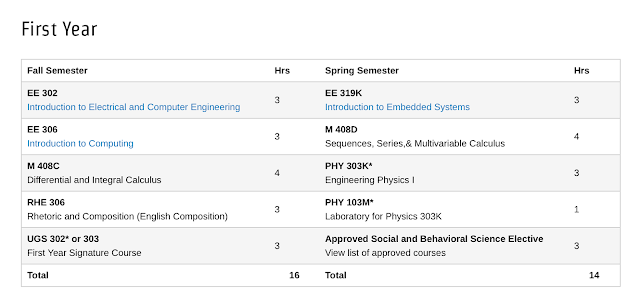Trek over to the page and take a look!
Embedded Systems- UT.6001x
Blog for Embedded Systems EdX Mooc: Support questions, status and interactions.
Wednesday, October 23, 2013
Registration is Open!
After several months of working and getting ready... the UT 6.001x MOOC Course is now officially open for Registration!
Friday, February 15, 2013
UT Austin MOOC Accepted- Spring 2014!
After extensive conversations, the UT Austin Proposal to "MOOC" EE319K has been accepted!
The course will be offered Spring 2014!
What does this mean?
Professors Dr. Jon Valvano and Dr. Yemesh Yerreballi will be working for the next year to adapt current EE 319K to the EdX MOOC Format. Currently EE319K is a lecture + lab format and intention is to keep both in the MOOC deployment!
The course will be offered Spring 2014!
Click here for the full press release from UT Austin's communications site.
What does this mean?
Professors Dr. Jon Valvano and Dr. Yemesh Yerreballi will be working for the next year to adapt current EE 319K to the EdX MOOC Format. Currently EE319K is a lecture + lab format and intention is to keep both in the MOOC deployment!
Saturday, January 5, 2013
EE319K- Introduction to Embedded Systems
Since EE319K: Introduction to Embedded Systems is the candidate for the MOOC Proposal, we thought it would be good to take a look at the current course to get an idea what the MOOC will look like!
Overview
High Level:
The course is a lecture + lab format.
There are about 15 lectures and 10 labs, homework and final exam.
The course is based on Introduction to Embedded Systems- Volume 1 and
Students are expected to purchase hardware and own the equipment.
In the beginning of the course students can come with only a basic understanding of programming and physics. By the end of the course students should be able to make a video game (Space Invaders is the most popular one)!
More Details:
EE319K currently is a required course in the UT Austin Electrical and Computer Engineering curriculum. It is taught by several members of the UT ECE faculty (Bard, Erez, Gerstlauer, Telang, Valvano, Yerraballi) and has over 300 students in the course during the year. It is part of the main sequence and coupled with basics of computer programming, forms the foundation for the rest of the degree plan.
Below was taken from the Course Page: http://users.ece.utexas.edu/~valvano/EE319KF13.html
Course Catalog Description
Embedded systems; machine language execution; assembly and C language programming; local variables and subroutines; input/output synchronization; analog to digital conversion and digital to analog conversion; debugging; and interrupts.
Overview
EE319K will continue the bottom-up educational approach, started in EE302 and EE306. The overall educational objective is to allow students to discover how the computer interacts with its environment. It will provide hands-on experiences of how an embedded system could be used to solve EE problems. The focus will be understanding and analysis rather than design. The analog to digital converter (ADC) and digital to analog converter (DAC) are the chosen mechanism to bridge the CE and EE worlds. EE concepts include Ohms Law, LED voltage/current, resistance measurement, and stepper motor control. CE concepts include I/O device drivers, debugging, stacks, FIFO queues, local variables and interrupts. The hardware construction is performed on a breadboard and debugged using a multimeter (students learn to measure voltage and resistance). Software is developed in ARM Cortex-M assembly and C; most labs will be first simulated then run on the real LM4F123/TM4C123 board. Software debugging occurs during the simulation stage. Verification occurs in both stages. Labs 1, 2, 3, 4, 5 are written in ARM assembly language. Labs 8 and 9 are written in a combination of assembly and C. Labs 6 and 10 are written in C.
Thursday, November 15, 2012
Submitting Proposal for UT Austin MOOC- Embedded Systems
Based on the popular UT Austin Course EE319K- Dr. Jonathan Valvano will be submitting to UT Austin a MOOC Proposal.
Details of the current EE319K course can be found here (as well as student reviews here).
This course, is required in the UT Austin EE curriculum receives some of the highest reviews from students and if accepted will be available World Wide for any student with an internet connection to take!
Subscribe to:
Posts (Atom)



